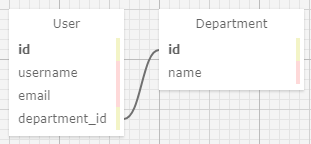Basic REST API using Flask, Flask-RESTful, Flask-Marshmallow, and Flask-SQLAlchemy.
All endpoints return JSON formatted output.
All endpoints return the actual data encapsulated in the data key, e.g.
{
"data":{
"id":2,
"username":"guest",
"email":"guest@example.com",
"_links":{
[...]
}
}
}
The /users endpoint provides the User ressource.
| HTTP Method | URI | Action |
|---|---|---|
| GET | /users | Retrieve list of users |
| GET | /users/[id] | Retrieve a user |
| POST | /users | Create a new user |
| PUT | /users/[id] | Update an existing user |
| DELETE | /users/[id] | Delete a user |
The /departments endpoint provides the Department ressource.
| HTTP Method | URI | Action |
|---|---|---|
| GET | /departments | Retrieve list of departments |
| GET | /departments/[id] | Retrieve a department |
| POST | /departments | Create a new department |
| PUT | /departments/[id] | Update an existing department |
| DELETE | /departments/[id] | Delete a department |
Users may have a relation to a Deparment (see app/models.py).
| HTTP Method | URI | Action |
|---|---|---|
| GET | /departments/[id]/users | Retrieve a list of users for a department |
All endpoints that return a list of entities support pagination.
For controlling the pagination there are currently two paramters in place.
Both paramters can be passed as URL parameters (e.g. /users?limit=5&offset=2).
limit: Number of requested results per response/pageoffset: Offset of requested results
Every endpoint which supports pagination is indicating this by returning some info about its size.
total: Total number of entities within the ressource
{
"offset":2,
"limit":5,
"total":21,
"data":[...]
}
